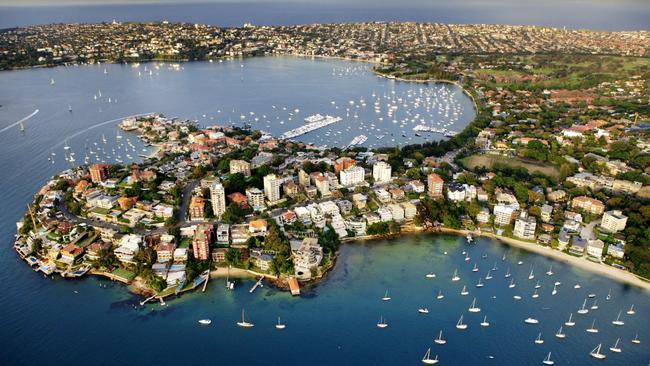Some of Australia’s most exclusive suburbs are also the most indebted
Homeowners in some of the nation’s most expensive suburbs are bracing themselves for another interest rate rise, with equity offering little protection for what may lie ahead, new data reveals. SEARCH YOUR POSTCODE

The strong equity positions of Australian homeowners will do little to reduce mortgage stress as households brace for another interest rate rise next month, experts say.
New analysis by The Australian of data from mortgage brokerage Lendi and CoreLogic has revealed homeowners in more than 150 postcodes around the country have less than 40 per cent equity in their homes, with 49 scrapping by with less than a standard 20 per cent deposit.
Some of Australia’s most indebted suburbs are also some of the most expensive, with the average homeowner in Perth‘s leafy suburb of Cottesloe, Sydney’s Bellevue Hill and Boroondara in Melbourne’s east carrying less than 10 per cent equity despite multimillion-dollar median property prices.
Lendi chief operating officer Sebastian Watkins record low mortgage rates through the pandemic spurred many to borrow as much as they could.
“It’s very easy to get comfortable with a smaller equity position and a higher debt position if the debt isn’t costing you too much money,” Mr Watkins said.
“I know that most consumers would never have envisioned a 6.5 per cent interest rate when they were taking their loans out two or three years ago.”
On the other hand, 56 locations recorded had more than 100 per cent equity in their homes, with many benefiting from huge pandemic property value gains of more than 30 per cent. No postcode was in negative equity.
CoreLogic’s director of research Tim Lawless said many mortgaged households have benefited from extreme capital gains and longer hold times, with the average hold time blowing out from 9 years to 13.5 years.
“Turnover, overall, is well below average and that’s just part and parcel of the fact that cost of debt is very high transactional costs are still extremely expensive, so is stamp duty. Also, consumer sentiment is really low,” he said.

But, the economist noted wealth on paper does not help household budgets as many juggle cost-of-living pressures and a dozen interest rate rises in less than 18 months adding thousands to their mortgage repayment each year.
“Cash flow is key during these times,” Mr Lawless said.
“That’s probably the frustration for some people; they may feel like they’re quite wealthy, but that on paper wealth doesn’t pay the bills.”
Mr Watkins said the benefit increased equity is those struggling with repayments can refinance their loan and reduce costs, so long as they can meet serviceability requirements.
“If you have the equity, it definitely does open up more options … but only if you’ve got income to back it up,” Mr Watkins said.
A rise in inflation figures last week has increased he likelihood of the Reserve Bank lifting interest rates by 0.25 per cent next month, ending a streak of four consecutive pauses.
SEARCH YOUR POSTCODE*
Household savings accumulated through the pandemic are now being used up to fill budget shortfalls. Barrenjoey chief economist Jo Masters expects mortgage arrears to begin rising by mid next year, with analysis suggesting most savings will be eroded by March.
“Clearly some households will be finding it really difficult. But one of that is the fact that the labour market is still very strong,” Ms Masters said.
“The other thing is, at the moment, the labour markets easing, but it’s still very tight, which means that households are able to access additional hours … and we know that is helping to support household income over and above just wage growth.”
However, CoreLogic’s Mr Lawless believes many will prove reluctant to sell up to access their equity after pulling back spending and using their savings.
“Most people who may be in a in a financially stressful position, or probably just trying to weather the storm as well as they can,” he said.
“For a lot of people, if they have to sell and buy into something like a downgrade option, it’s going to be one of the last case decisions that they make, and will probably be prompted by in inability or a recognition that they may not, may not be able to keep up to date with their mortgage repayments.”
*Some postcodes have been deleted due to insufficient data





To join the conversation, please log in. Don't have an account? Register
Join the conversation, you are commenting as Logout